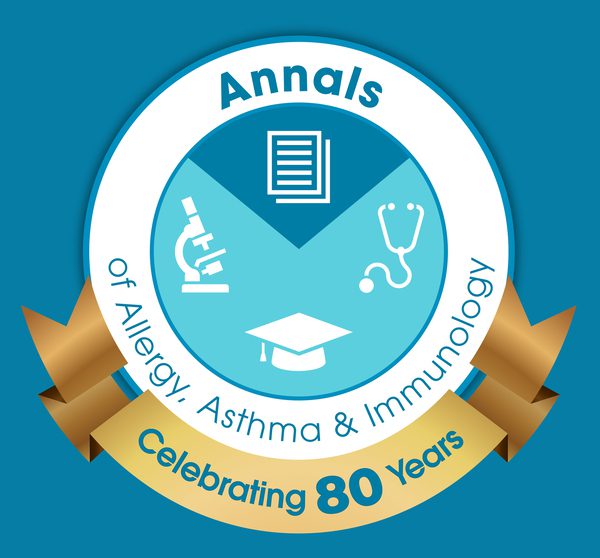Happy Birthday to Annals! This month marks the 80th year of publication of the journal formally known as Annals of Allergy (now Annals of Allergy, Asthma, and Immunology). Astute readers will note that the cover of the journal has been changed temporarily to celebrate this milestone, and a special series on the practice of allergy and immunology “then and now” will run throughout volume 131 of Annals. In the current issue, there is an overview of the history of the journal from former and current editors-in-chief that gives some context for the growth and development of Annals. Another article examines how communication of evidence and translation into practice has changed over the 80 years of Annals existence. Grab a nice slice of cake and celebrate Annals’ birthday!
While celebrating 80 years of Annals’ excellence could be sufficient for an entire issue, it is not the actual focus of the July issue. This issue is focused on new or emerging therapies for food allergies. There are intriguing perspectives examining whether it is time to target alarmins for food allergy, as well as a discussion of the role of proximity challenges in food allergy (read “The peanut butter didn’t attack me”). Have you thought about using anti-IgE therapy in your approach to food allergy? An insightful CME Review this month explores the utility of anti-IgE alone or in combination with oral immunotherapy. Other reviews focus on the roles of biologic therapy, kinase inhibitors, oral immunotherapy, and anti-Siglec 8 treatment for food allergy. These reviews give insight into where the field is going and provide guidance on altering your practice to provide the best evidence-based therapy to your patients. And if you are looking for a laugh, the Marginal Zone Cartootorial explores how anti-IgE keeps mast cells “dancing” in the peanuts (yes, you read that correctly).
Outside of this month’s theme, there is a review exploring efficacy of biologic therapies on airway function in patients with asthma. Original articles this month include an examination of the use of tiotropium for refractory cough in patients with asthma, the effect of dupilumab on asthma biomarkers, the role of prenatal antibiotics in asthma development, and the influence of social determinants of health on childhood wheezing. By the way, do you know what happens to adherence to immunotherapy when patients have no out-of-pocket expenses? Find out in this month’s Annals.
The Letters section explores COVID-19 vaccine skin testing and challenges, adherence to asthma medications during the pandemic, the effect of asthma on regulatory B cells, surveillance of alpha-gal syndrome, and the disparity between actual immunotherapy dosing and practice parameters. Some quick and useful reads!
Just a reminder that we are accepting nominations for the 2023 ACAAI Annals fellow-in-training (FIT) awards! Nominations should be sent by email to Annals@ACAAI.org and must be received by Aug. 15, 2023. Read the full instructions to nominate a worthy fellow’s work.
I think you will agree – Annals’ 80th year is off to a great start. Grab some cake, blow out the candles, and join us in celebrating the past and embracing the future – and as always, if you have any comments, please consider sending a correspondence to Annals (email us at Annals@ACAAI.org). We are always excited to hear how Annals has helped you improve your practice and the lives of your patients!
Mitchell Grayson, MD, FACAAI
Editor-in-Chief

